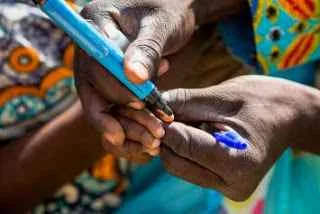Gates Foundation’s GCE on “Innovations for Improving the Impact of Health Campaigns”
Deadline: 13 November 2019
The Bill & Melinda Gates
Foundation is currently accepting proposals for the Round 24 of the
Grand Challenges Exploration on the topic of “Innovations for Improving
the Impact of Health Campaigns”.
The Foundation is seeking
innovative solutions that accelerate the improvement of coverage, reach,
efficiency, and effectiveness of health campaigns. The Foundation is
looking for innovations in approaches, practices, or tools that
dramatically improve the planning and microplanning, implementation /
operations, and monitoring and evaluation that will lead to improved
effectiveness of campaigns.
Recommended:
In
order to contribute to the development and spread of campaign “best
practices”, a solution should be applicable to campaigns beyond the
context in which it is originally tested (e.g. applicable in multiple
lower- to middle-incomes countries and/or applicable across multiple
types of health campaigns such as immunization, NTDs, malaria, or
nutrition).
The Foundation is especially interested in novel
approaches that draw on innovation from large-scale delivery models
outside of the health sector, which may include interventions used in
the private sector.
Successful proposals should consider the following phases of campaign delivery:
Planning
and microplanning: This includes the planning processes – led by
governments and often supported by partners – at the national,
sub-national, facility, or community levels. Overall planning supports
the mobilization of information and resources needed to conduct the
campaign, and microplanning specifically addresses the detailed,
delivery-level planning required to reach intended populations with the
health intervention. Innovations might include/consider:
Modeling
and analytics to test, identify, and recommend more effective
implementation approaches (e.g. modeling to identify optimal location of
campaign fixed sites and outreach posts in order to improve community
access).
Novel or nontraditional information or data sources to
improve the accuracy of planning (e.g. geospatial data to improve
population estimation or location and more accurately plan for and
target campaign delivery).
Technologies for developing and using
community maps or populations that can help campaigns to better reach
their intended age groups or sub-populations.
Interactive
or adaptive microplans that better incorporate past or real-time data
(e.g. based on prior campaign performance or operational monitoring
data) to guide planning and implementation.
Increased automation of microplans (e.g. updating, adapting microplans for other platforms).
Implementation
/ operations: Improvement in this area may encompass all aspects of
campaign operations, ranging from logistics management, identification
and reach of target populations, delivery of interventions, management
of human resources (including payments, incentives, and training), data
collection & analysis, and supervision. Innovations might
include/consider:
Novel approaches to leverage data, maps, or
other information or data to better identify and reach high-risk or
unreached (e.g. “zero dose”) populations.
Approaches to delivering campaigns in a way that prioritize high-risk or vulnerable populations.
Leveraging
of novel partnerships such as linking with other disease control
programs, community initiatives, or religious or traditional structure
that may improve campaign outcomes.
Use of innovative technologies to support logistics management, campaign supervision, data collection and use.
Recommended:
MODE OF APPLICATION: APPLY ONLINE
Monitoring and evaluation: Campaigns rely on monitoring and evaluation both during and after the campaign to understand campaign performance, identify populations that require post-campaign mop-up or targeting, to inform post-campaign improvement activities and routine system strengthening and identify lessons learned. Additionally, although M&E has not been used to systematically test and identify promising or best practices that may be replicated across geographies or campaign types, there is an opportunity to improve the use of iterative testing or operations research to identify best practices. Innovations might include/consider:
Novel approaches to understanding the effectiveness of campaign planning and implementation while campaigns are ongoing or during post-campaign evaluations.
Approaches for measuring and incorporating real time process, quality, and coverage improvement during campaigns.
Methods of identifying, testing, and disseminating lessons learned and promising or best practices.
Award Information
Awards of $100,000 USD are made in Phase I. Phase I awardees may have one opportunity to apply for a follow-on Phase II award of up to $1,000,000 USD.
Eligibility Criteria
GCE is open to both foreign and domestic organizations, including non-profit organizations, for-profit companies, international organizations, government agencies, and academic institutions.
Read Also:
NEW JOBS OPPORTUNITIES 2019 (2,430+ POSTS)
Criteria for success include solutions that:
Are transformative, novel, or innovative. These interventions will significantly change the way in which campaigns are planned, conducted, or evaluated by proposing new ways of working, leveraging lessons from other sectors, or increasing transparency and effectiveness.
Could be used by various health campaigns beyond the campaign in which the innovation is originally conceptualized or tested, such as for immunization (measles, yellow fever, meningitis, etc.), neglected tropical diseases (trachoma, onchocerciasis, schistosomiasis etc.), nutrition (vitamin A, deworming), malaria (bed net distribution, seasonal malaria chemoprophylaxis), and polio.
Could be used in various low- and middle-income countries beyond the country in which the innovation is originally conceptualized or tested.
Can be designed, tested, and scaled as a “best practice”.
Can be applied in low- and middle-income countries.
Are cost effective.
How to Apply
Interested applicants can apply online via the given website.
For more information, please visit CLICK HERE!






No comments:
Post a Comment